
Introduction
As thousands of Tibetans and supporters gathered across the globe on July 6 to celebrate the Dalai Lama’s 90th birthday, Chinese authorities dramatically escalated security operations throughout Tibet, deploying armed forces with live ammunition, establishing round-the-clock checkpoints, and conducting house-to-house searches while banning traditional religious observances including prayer ceremonies and burning incense. Cyberattacks intensified in the weeks leading
up to the birthday, with threat actors impersonating
genuine Tibetan exile websites.
- Video footage from Lhasa captured the stark contradictions in Tibet today. Chinese tourists photographed Tibetan pilgrims prostrating around the sacred Jokhang temple, metres from heavily armed special forces carrying implements designed to restrain self-immolators. The extent of the militarisation during the birthday period was so overwhelming this year that in one social media post, an alarmed Chinese tourist compared the atmosphere to Ukraine, asking if the Chinese army
was going to war. - The coordinated security operation, which intensified in mid-June and peaked around the Dalai Lama’s birthday, was accompanied by comprehensive information control measures designed to create a media blackout. The restrictions were aimed at ensuring that both Tibetans and Chinese citizens remained uninformed about the exile celebrations and the Dalai Lama’s statement on 2 July confirming that the institution of the Dalai Lama would continue.
- In Amdo, a young Tibetan musician from Ngaba (Chinese: Aba) was detained between 30 June to 6 July after a live performance on one of his Chinese social media platforms Kuaishou covering a song with lyrics alluding to His Holiness the Dalai Lama, although not by name. Tsuktay is also known as Asang, and his social media account has since been deleted. With no information about his current whereabouts, Tibetans in exile who saw his live-stream fear that Tsuktay was detained for singing the song in the week leading up to the Dalai Lama’s 90th birthday.
- Despite the overwhelming security presence, some Tibetans found creative ways to express their devotion to the Dalai Lama. In response to official Chinese propaganda about reincarnation policies, social media users responded with folded hands emoji—a subtle but unmistakable expression of prayer and respect – birthday cake icons, and Buddhist phrases about compassion.
The Chinese leadership views questions of the future of the Dalai Lama institution as a “protracted war,”1 regarding control over Tibet’s religious elite as crucial to maintaining its grip on the strategically vital region. Celebrating the Dalai Lama’s birthday has not been permitted for years as the Party authorities seek to eliminate the Tibetan religious leader’s influence in his homeland. Several monks are still in prison for organising picnics to celebrate the Dalai Lama’s 80th birthday ten years ago; Drugdra, a 50 year old Kirti monk is serving 14 years in prison, while monk and scholar Lobsang Khedrub, who had been released from prison from an earlier sentence in 2011 due to severe ill-health, probably due to maltreatment and torture, was sentenced to 13 years for the same incident in 2015.2 In 2013, around 14 Tibetans sustained serious gunshot wounds in Tawu, Kardze (Chinese: Ganzi) after police opened fire at a peaceful gathering to mark his 78th birthday.


